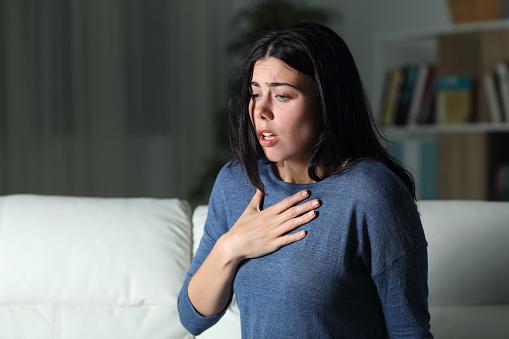
When you experience anxiety, everything seems threatening. Everything feels out of your control. You’re scared of everything, and nothing feels good anymore. In these moments, the best way to feel better is to find a way to relieve your anxiety, and thus you may need the best antihistamine for anxiety.
Antihistamines work by blocking the effects of histamines, which are compounds that cause your body to produce natural histamines. When you have anxiety, your body produces histamines to help you cope with stress. However, these chemicals (histamines) make you feel really uncomfortable instead of feeling comforted.
That’s why you feel anxious.
If an antihistamine is able to block the effects of histamines, then your body will no longer feel the symptoms of anxiety. Antihistamines are also used to treat other conditions as well. They’re considered the safest over-the-counter treatment for anxiety because they don’t have any side effects. They’re also the most effective antihistamine.
Let’s explore together what antihistamines are and how they help with anxiety:
Contents
What Are Antihistamines?
Antihistamines are medications that reduce the symptoms of inflammation, anxiety, and allergies. They do so by blocking the effects of histamines in your body.
Histamines are a type of neurotransmitter that your body creates when you experience stress. These neurotransmitters cause uncomfortable feelings like anxiety and trembling. Antihistamines block these effects by preventing histamines from being released in the first place.
Some antihistamines work by simply reducing the production of histamine. Others work by stopping the release of histamine from cells in your body (e.g., mast cells). The most common side effects of antihistamines are dry mouth and drowsiness, but many types have less common side effects as well.

How Do Antihistamines Work?
Antihistamines work by blocking the effects of histamines, which are compounds that cause your body to produce natural histamines. When you have anxiety, your body produces histamines to help you cope with stress.
However, these chemicals make you feel really uncomfortable instead of feeling comforted. That’s why you feel anxious. If an antihistamine is able to block the effects of histamines, then your body will no longer feel the symptoms of anxiety.
Examples of Antihistamines
There are many antihistamines available on the market today.
- Xyzal is an antihistamine that’s taken orally as a fast-acting treatment for allergies and other symptoms.
- Hydroxyzine (Vistaril, Atarax) is taken to relieve itching caused by allergic skin reactions in children and adults
- Claritin is a non-drowsy, long-lasting allergy medication.
- Allegra is a non-drowsy, high-performance allergy and asthma medication.
- Zyrtec is a non-drowsy medicine you can take daily to relieve your allergies. It can also be used to treat hives and itching.
- Loratadine is an antihistamine that treats hives and other allergic reactions.
- Diphenhydramine (Benadryl) used for common colds and other allergies
Side Effects of Antihistamines
Just because antihistamines are the safest treatment for anxiety doesn’t mean they’re completely risk-free. Like all drugs, there are certain side effects to consider. Some of these include:
- Dry mouth
- Drowsiness
- Sedation (sleepiness)
- Blurred vision
- Itchiness
- Headache
- Constipation
Almost every antihistamine has a warning against driving or operating heavy machinery as you may become drowsy while using them. If you take them before bed, be sure to avoid alcohol since this can increase your risk of drowsiness. Antihistamines work by blocking the effects of histamines which are compounds that cause your body to produce natural histamines when you have anxiety.
When you have anxiety, your body produces histamines to help you cope with stress. However, these chemicals make you feel really uncomfortable instead of feeling comforted. That’s why you feel anxious.
If an antihistamine is able to block the effects of histamines, then your body will no longer feel the symptoms of anxiety. They’re considered the safest treatment for anxiety because they don’t have any side effects and are also one of the most effective antihistamines.
How Effective Are Antihistamines for anxiety?
Antihistamines are very effective in relieving anxiety, but they’re not the only treatment that can help. They’re also not a complete cure like an SSRI is.
Some people who take antihistamines don’t feel any relief at all. Others feel only minor relief, while some people experience major relief. So, it depends on your body and how you react to various medications.
Top 5 Antihistamine for Anxiety: Reviews and Guide
1. Hydroxyzine:
Hydroxyzine (Vistaril, Atarax) is the most popular antihistamine for anxiety because it has the fewest side effects and the least risky interactions with other drugs. Its primary role is in the management of allergic conditions, especially skin-related allergies.
It is a good medication to manage anxiety, tension, and nervousness caused by emotional conditions including depression stress, and anxiety disorders. Moreover, doctors prescribe it to manage anxiety and induce sleep when one is going for surgery.
It’s also a good option if you want to take the drug long-term as it doesn’t have as many drawbacks. It can be used alone or in a combination with other medications.
2. Benadryl
Benadryl (diphenhydramine) is an antihistamine that’s commonly used to treat allergies and can be used to treat anxiety too. It has some side effects like dizziness, but it’s still a pretty popular drug for treating anxiety because of how well it works.
However, just because the medication leaves you sedated and drowsy, it does not mean that it is very effective in calming anxiety. Thus, the medication is used as an off-label treatment for anxiety just like other antihistamines like Vistaril above in the short-term management of anxiety.
Some physicians prescribe Benadryl for anxiety management in children and adolescents suffering from anxiety disorders. Benadryl risks in most cases outweigh the benefits when managing anxiety even though some people get relief from anxiety when they take the medication.
One of the primary reasons people take the medication for anxiety is because it is fast acting. You will get relief in about 15 to 30 minutes when the medication starts working but the peak calming and sedation effects are felt about 2 to 4 hours after taking Benadryl.
Because of the sedation and drowsiness nature of diphenhydramine (Benadryl), you will find it as an active ingredient in most over-the-counter sleep aids.
3. Promethazine:
Promethazine is by far the most potent antihistamine on this list, but it also comes with a lot more common side effects like drowsiness and nausea than other options on this list.
It’s not recommended for anyone who has never taken an antihistamine before or someone who takes a lot of other medications as well as this one.
4. Loratadine:
Loratadine is best for those who are looking for an antihistamine that isn’t sedating or addictive, so it’s an excellent choice if you only need occasional relief from your anxiety symptoms.
5. Chlorpheniramine:
Chlorpheniramine is another great antihistamine but does not offer much relief from anxiety. It is also sedating.
How Effective Are Antihistamines for anxiety?

There are a lot of great antihistamines on the market, but they’re not all equally effective. Some work better than others, and some are more suitable for certain people. For example, if you have a cold or allergies, then you should take an antihistamine that’s designed to treat those conditions.
Some antihistamines are more effective than others in treating anxiety, but they’re not very effective for severe anxiety or depression and they’re not a long-term treatment for any anxiety disorder. You can use an over-the-counter combination of an antihistamine and a decongestant to provide relief from nasal congestion from allergies or a cold.
But if your anxiety is severe, you’ll want to talk with your doctor about getting prescription medication that’s best suited for your needs and symptoms.
Can I use Hydroxyzine for anxiety?
Hydroxyzine is an antihistamine that is used by doctors for its calming and mild sedative effects to help control anxiety and tension caused by nervous and emotional conditions like before surgery. The medication is taken in a divided total daily dosage of 50 mg to 100 mg. But if you’re interested in using an antihistamine to help with your anxiety, talk to your doctor first.
You can also take a look at the following information to understand what types of antihistamines are available and which one would be best for you.
There are two types of antihistamines: those that come as pills, like Zyrtec and Benadryl, and those that come as liquids, like Hydroxyzine. These medications work differently on the body. Pills work faster but don’t last as long; hydroxyzine is slower-acting but has a longer duration of action.
If you’re looking for something quick-acting, Zyrtec or Benadryl might be best for you. But if you want something to last all day long, hydroxyzine is your best bet.
How much hydroxyzine should I take for anxiety?
If you want to prevent physical symptoms like nausea, vomiting, or a blocked nose, then take 25-mg doses two times per day.
If you want to prevent the mental symptoms of anxiety such as fear and worry, 25-mg doses two to four times per day is recommended. The maximum dosage for adults is 100 mg, taken up to four times per day.
To relieve the physical symptoms of anxiety, 12.5-mg doses are enough: one to two doses every six hours. For mental symptoms, 12.5-mg doses should be taken one or two times per day.
Does hydroxyzine help with anxiety immediately?
Hydroxyzine is a prescription antihistamine that can be used to help with anxiety. It will take effect in 30 minutes and will feel its maximum effect at around 2 hours.
There are some considerations about the use of hydroxyzine for anxiety. This drug may have side effects, such as drowsiness, dizziness, tiredness, dry mouth, blurred vision and difficulty urinating. These symptoms usually go away after a few days of use but if they don’t go away it may be time to switch to another type of antihistamine for anxiety.
Another consideration when taking this drug is that it can interact with other drugs you might be taking. There is a small chance it can cause an allergic reaction and if you are having anxiety during your pregnancy or breastfeeding you shouldn’t take this drug without consulting your doctor first.
This drug is not recommended for people on MAOI antidepressants or those taking SSRIs because there could be dangerous interactions between these substances.
Is hydroxyzine used for panic attacks?

Histamine is a chemical that causes your body to produce natural histamines. When you have anxiety, your body produces histamines to help you cope with stress. However, these chemicals make you feel really uncomfortable instead of feeling comforted.
That’s why you feel anxious. If an antihistamine is able to block the effects of histamines, then your body will no longer feel the symptoms of anxiety. Hydroxyzine is an antihistamine and it works by blocking the effects of histamines in the body.
This means that if you take hydroxyzine when you have an attack, it should help decrease how long it lasts and how severe it is. Hydroxyzine can also be used for other conditions such as itching or allergic reactions to certain foods or medicines.
It has been shown to successfully help symptoms of panic attacks as well because it blocks the effects of histamines in the body which decreases how long they last and how severe they are.
Is hydroxyzine the same thing as Xanax?
No, Hydroxyzine (antihistamine) and Xanax (benzodiazepine) belong to different drug classes and are used to treat different conditions. Hydroxyzine (antihistamine) and Xanax (benzodiazepine) belong to different drug classes, so they’re not the same thing. However, they do have some similarities.
Antihistamines like hydroxyzine are used to treat anxiety, just like benzos like Xanax. That being said, there are differences between both types of drugs when it comes to how they work in the body and what their effects are on the body.
The most notable difference is that benzodiazepines cause side effects like drowsiness, dizziness, and forgetfulness as well as possible withdrawal symptoms if stopped abruptly. Antihistamines don’t cause any side effects or withdrawal symptoms when stopping the use of the medication.
These drugs also affect parts of your brain differently too: benzodiazepines activate GABA receptors while antihistamines block histamine receptors in the nervous system. In other words, one works on your anxious feelings by suppressing them while the other blocks out your ability to feel anxious at all.
The main difference between hydroxyzine and Xanax is that each belongs to a different drug class and has different effects on the body.
Which hydroxyzine is better for anxiety?
Vistaril (hydroxyzine pamoate) is better for treating anxiety or difficulty sleeping while Atarax (hydroxyzine hydrochloride) is better for treating itching and allergic reactions. If you want to find the best antihistamine for anxiety, your best bet is to figure out which hydroxyzine is better for you: Vistaril or Atarax.
Both drugs do the same thing, so it’s mostly a matter of what type of reaction you have that will determine which one is right for you. Vistaril is better for treating anxiety or difficulty sleeping while Atarax is better for treating itching and allergic reactions.
How effective is hydroxyzine for anxiety?
Hydroxyzine is an antihistamine that’s used to treat anxiety. When you have anxiety, your body produces histamines to help you cope with stress. However, these chemicals make you feel really uncomfortable instead of feeling comforted. That’s why you feel anxious.
Antihistamines are also used to treat other conditions as well. They’re considered the safest treatment for anxiety because they don’t have any side effects. They’re also the most effective antihistamine.
Hydroxyzine is just one of those medications that are not addictive and has no side effects. It blocks the feelings of anxiety which helps your brain regulate its natural production of histamines on its own terms- in turn alleviating your anxiety symptoms and feelings.
Does Benadryl calm anxiety?
Benadryl is a common antihistamine that’s used to treat sleep disorders and allergies. It’s a fast-acting medication, so if you need relief right away, this might be your best bet. Benadryl can also be purchased over the counter at most drug or grocery stores.
If you want a convenient way to deal with your anxiety without worrying about side effects, Benadryl may be the best option for you. Yes, you can use Benadryl for anxiety because it is fast-acting and convenient.
The only downside of Benadryl is that it doesn’t last very long; it generally needs to be taken every six hours in order to maintain relief from symptoms. But if you’re looking for something that will help you feel better quickly and easily, then this is probably the best antihistamine for anxiety for you.
Can I use Benadryl for anxiety?
Benadryl is an antihistamine. As an antihistamine, it’s used to treat allergies as well as other conditions, such as asthma, by blocking the effects of histamines. It’s used to relieve and control common cold and flu symptoms by constricting blood vessels and reducing swelling in your nasal passages.
Though Benadryl can be helpful for some types of anxiety, it’s not the best one on the market. Some people experience side effects when they use Benadryl for anxiety because it can cause drowsiness or dry mouth.
However, if you don’t have any side effects when you use this medication for anxiety then you should try it out. It’s fast-acting, which is convenient because many people need relief quickly. It also has minimal to no side effects so you won’t have to worry about long-term damage like with benzodiazepines or antidepressants.
Hydroxyzine vs Benadryl for anxiety
Hydroxyzine is a common antihistamine that’s used to treat anxiety and reduce the physical symptoms of anxiety. It has been approved by the FDA for these uses, so it’s considered safe for long-term use.
Benadryl and hydroxyzine are both common options for treating anxiety. However, there are some differences in their effectiveness and side effects that you should know before choosing which medication to use.
For example, both Benadryl and hydroxyzine will decrease the amount of natural histamines produced by your body which will help you feel less anxious. But while Benadryl is considered safe for long-term use, you can develop dementia if taking it long-term.
Benadryl is an over-the-counter medication that’s designed to treat allergies. However, Benadryl is often used as an alternative for treating anxiety. There are some side effects that come along with taking Benadryl for an extended period of time though: increased anxiety, agitation, and nervousness are potential side effects of Benadryl.
This is because Benadryl may also cause agitation and nervousness, especially with increased doses. Hydroxyzine is considered a better option because it’s not likely to increase your risk of developing dementia when used long-term.
Additionally, an increased risk of dementia has been associated with the long-term use of Benadryl. Hydroxyzine is a better option because it’s less likely to cause the unwanted side effects that come along with Benadryl.
Which antihistamine is best for anxiety?
Hydroxyzine is the most commonly prescribed antihistamine for anxiety. It’s also the most beneficial for people who have chronic anxiety.
Hydroxyzine is a common antihistamine for anxiety because it has few side effects and is easy to take. Hydroxyzine works well for people with chronic anxiety because it blocks the actions of histamines on your body, which means you can reduce your symptoms with this medication.
If you have occasional flare-ups of anxiety, then Benadryl, Zyrtec, or Chlor-Trimeton might work better for you. These are short-term medications that often come in pill form or drops that you place under your tongue or in your nasal passage to help reduce the severity of an allergy attack.
Can antihistamines worsen anxiety?
There are some antihistamines that can worsen anxiety. If you’ve been prescribed an antihistamine, be sure to talk to your doctor about all the possible side effects it may have.
Conclusion
Do you get anxious from the sound of sirens or the sight of blood? Do you feel anxious while traveling or during social gatherings? Do you feel anxious in confined spaces or around animals? Do you feel anxious when you are around people? Do you feel anxious in the middle of the night or when you’re under intense stress?
Anxiety can strike at any time and it can be quite hard to get rid of. However, there are many natural remedies that help in reducing the level of anxiety.
One of the most effective remedies for reducing anxiety is an antihistamine. Antihistamines are commonly used to treat symptoms such as itching, hives, sneezing, runny noses, and congestion. They are also used to treat symptoms of anxiety, such as nervousness and anxiety.
FAQs
Can Zyrtec help with anxiety?
Zyrtec can help with anxiety since it is an antihistamine that is effective and safe not only for allergies but also for anxiety. However, Zyrtec isn’t effective for severe anxiety or depression. Moreover, you should not use the medication for long-term treatment of any anxiety disorder
Which antihistamine is best for anxiety?
Most patients and doctors recommend Hydroxyzine for anxiety. The medication has several uses in allergic reactions but also is approved for anxiety. The main use of hydroxyzine is to treat difficulty sleeping, nausea, vomiting, itching, skin rash, and allergies.
Can allergy medicine reduce anxiety?
Allergic medicines are fast-acting and convenient in the management of anxiety. Therefore, due to being fast-acting and convenient, they are able to rapidly reduce the symptoms of mild anxiety. However, you should note that most antihistamines can cause drowsiness and sleepiness.
Citations:
https://medlineplus.gov/druginfo/meds/a682866.html
https://psychcentral.com/anxiety/can-you-take-benadryl-for-anxiety-symptoms
https://www.webmd.com/drugs/2/drug-5680/benadryl-oral/details
